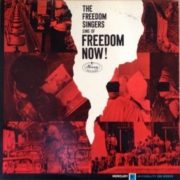SWEET HONEY IN THE ROCK AT CAP—UCLA
SWEET HONEY IN THE ROCK AT CAP—UCLA
Royce Hall Kickoff to 45th Anniversary Tour
Friday, November 30, 2018, 8:00pm
THE LONG ROAD BACK TO SWEET HONEY IN THE ROCK
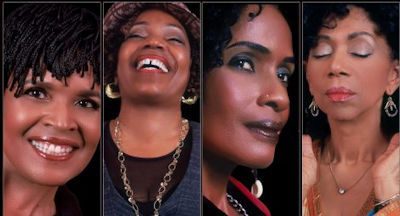 Sweet Honey in the Rock is middle-aged, gifted and black—and they are the best ambassadors of good will we have: the all-female gospel quartet who suddenly and almost magically appeared on an empty Royce Hall stage last night.
Sweet Honey in the Rock is middle-aged, gifted and black—and they are the best ambassadors of good will we have: the all-female gospel quartet who suddenly and almost magically appeared on an empty Royce Hall stage last night.
For forty-five years now they have been singing truth to power. And they didn’t appear by magic. They have a history that parallels the history of America in the second half of the 20th Century, and cannot be fully understood and appreciated without knowing something about it. There is a long road back to their beginnings, and I was at their concert because I wanted to tell their story.
It all started with Dr. Bernice Johnson Reagon, who was a member of the a cappella Mississippi Freedom Singers when she was Bernice Johnson. She married founding member Cordell Reagon in 1961—and the Freedom Singers became the musical voice of SNCC, the Student Nonviolent Coordinating Committee. They were “discovered” by Pete Seeger, who recommended that they start touring on behalf of SNCC—which they did. That led to their breakthrough performances at the Newport Folk Festival in July, 1963, where they joined hands with Bob Dylan, Pete Seeger, Theodore Bikel and Peter, Paul and Mary to sing We Shall Overcome and Blowing In the Wind on the final night of the festival—documented by Vanguard Records on their Newport series—and one of the iconic photographs of Newport. That in turn led to their performance at the March on Washington on August 28, 1963. And that in turn led to their classic performance at Carnegie Hall with Pete Seeger in the fall, documented on Seeger’s Grammy-winning folk album, We Shall Overcome, on Columbia Records.
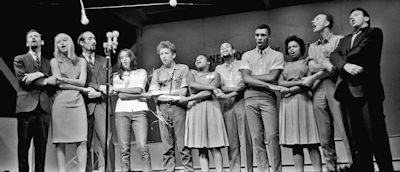
The civil rights anthem was performed at the very first meeting of SNCC in 1960 by Highlander Folk School’s Music Director Guy Carawan and from there traveled all around the world—to Tiananmen Square in Beijing, China—where it was sung spontaneously by Chinese students demonstrating for democracy on June 4, 1989—before many of them were massacred by the “People’s Liberation Army.” The Freedom Singers—who sang it first in the Deep South—were there in spirit. They are my original “Gatekeepers of Freedom.”
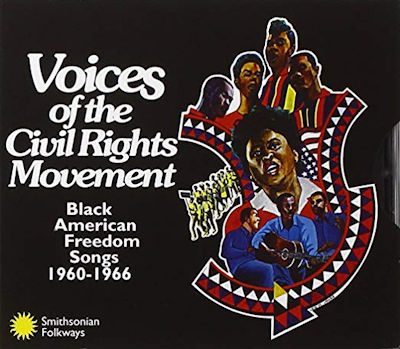
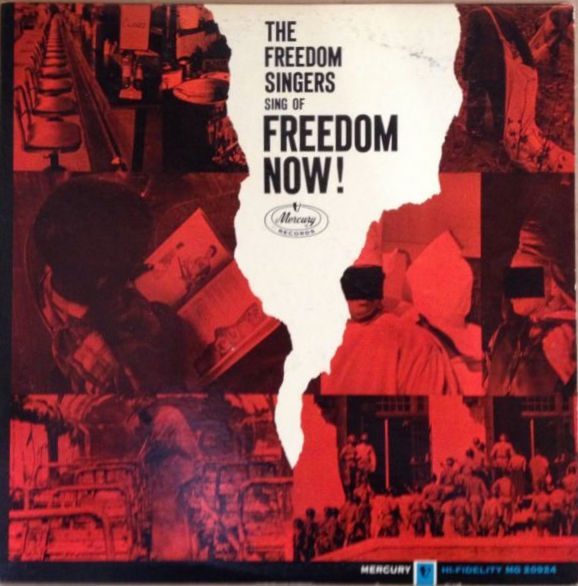 The Freedom Singers recorded only one album—on Mercury Records—a treasure to anyone lucky enough to have it—but their influence far transcends their recorded legacy. Most of their performances were on picket lines and in jail houses during the heyday of the civil rights movement—the soundtrack of the movement—which were later collected by Bernice Johnson Reagon on the Smithsonian Folkways album Voices of the Freedom Movement 1962-1966. Reagon was invited by President Barack Obama, along with Dylan and Joan Baez and Smokey Robinson, to the White House in 2008 for a concert of Civil Rights Songs.
The Freedom Singers recorded only one album—on Mercury Records—a treasure to anyone lucky enough to have it—but their influence far transcends their recorded legacy. Most of their performances were on picket lines and in jail houses during the heyday of the civil rights movement—the soundtrack of the movement—which were later collected by Bernice Johnson Reagon on the Smithsonian Folkways album Voices of the Freedom Movement 1962-1966. Reagon was invited by President Barack Obama, along with Dylan and Joan Baez and Smokey Robinson, to the White House in 2008 for a concert of Civil Rights Songs.
Ten years after the March on Washington Bernice Johnson Reagon founded Sweet Honey in the Rock in 1973. She retired from the group in 2004, but it goes on—now entering its 45th year of continual performing and recording, with a kickoff performance under the auspices of UCLA’s Center for the Art of Performance (CAP) at Royce Hall, November 30. I feel a personal connection to the group due to their Grammy Award for Best Traditional Folk Album for their recording of Lead Belly’s children’s song the Grey Goose, since it is Lead Belly’s song that gave me the name for my music publishing company Grey Goose Music and my email address greygoosemusic@aol.com
It’s a song about an indestructible goose that survives many attempts to kill it—by a preacher with a shotgun, and knife, fork and various predatory animals like hogs and sharks and even automatic saws—until:
The last time I seen him
Lord, Lord, Lord
He was flying over the ocean
With a long string of goslings.
The grey goose is a symbol of survival against all odds—like African-Americans have survived against slavery, segregation, Jim Crow, racism, poverty and ongoing machinations of Congress and The White House.
It’s a triumph of courage and imagination over social and economic oppression, and that is what Sweet Honey in the Rock represents. They have gone through twenty different voices and members down through the years, but they have never given up. And notwithstanding, they still have two original members who have endured through all the changes in personnel, and the addition of modern causes to their original civil rights repertoire.
This from their press release:
“Since 1980 the group has embraced inclusiveness of all people no matter what their abilities. Offering enjoyment for all at Sweet Honey In The Rock® concerts, American sign language was included as a regular part of the Sweet Honey experience with the addition of Shirley Childress, who remained sign language interpreter extraordinaire until her passing in 2017 after 37 years of service to the group.
This special anniversary concert features core singers Carol Mallard, Louise Robinson, Nitanju Bolade Casel, Aisha Kahlil and American sign language interpreter Barbara Hunt. The group is also accompanied by bass player Romeir Mendez and for this special presentation, percussionist Munyungo Jackson, saxophonist Azar Lawrence, and vocalists Rochelle Rice and Christie Dashille.
Funds for the CAP UCLA presentation provided by the Shirley & Ralph Shapiro Director’s Discretionary Fund.”
No surprise, the highlight of the opening half for me is their reaffirmation of Bernice Johnson Reagon’s timeless song, We Who Believe in Freedom Shall Not Rest, which was written from a line she first heard from her mentor Ella Baker. At their mention of Reagon’s name the Royce Hall audience erupts in applause. And they smartly pause so as not to interrupt the audience until they have finished—it is a lovely gesture to their founder. A close second is the classic Sweet Honey song We’re Gonna Do What the Spirit Say Do…with its tribute to Mrs. Rosa Parks—“We’re gonna sit when they spirit say sit,” “We’re gonna march when the spirit say march—from Selma to Montgomery”…and finally in tribute to the struggle for the right to vote, “We’re gonna vote when the spirit say vote!”
During the song archival photographs from the Movement are flashed up on the wall behind the stage—which serves as a movie screen throughout the concert. It makes for a 3-D presentation—an amazing on-going mural of illustrations to put their songs in historic context, including original artwork by Sophia Dawson.
I’m On My Way to Freedom Land, is a powerful song I first heard on Pete Seeger’s second 10-inch Folkways album A Pete Seeger Sampler—which I grew up on. “If you don’t go, don’t you hinder me,” sung by the entire Sweet Honey is an experience everyone should have—in four-part harmony. The audience member beside me sang along on every word—and I was just as moved by the expression in her eyes and face as by the music itself—she showed me why I was there—just beautiful.
As extraordinary as their musical performance was, however, the most memorable moment of this unforgettable evening was not a musical one—but theatrical, and not Broadway—or Off-Broadway, but guerilla theatre—and Brechtian in its scope.
It came in the second half of the concert, which was in large part a reflection on gun violence in America—and the terrible price it has cost black families above all. It was built on their extraordinary, uncompromising song The Women Gather, weeping a million tears for the loss of their children to the on-going availability of guns in “Anytown, USA” across this land. But the song was only the introduction.
Of a sudden, and somewhat mysteriously, one member approaches the front of the stage and lays out a beautiful tapestry in front a newly-place microphone, before silently returning to her seat alongside the others. Then one after the other all of Sweet Honey in the Rock approach the microphone and start reading a litany of names—some of which one recognizes—like Emmett Till, Trayvon Martin, Michael Brown and Walter Scott—but most of which are sadly anonymous to this day—all murdered by guns over the past sixty years. Each name is written on a small scrap of paper which is then dropped onto the tapestry. The final part of the scene is heart-stopping in its drama: The fourth member slowly reaches down and carefully folds all of the names into the tapestry—which she folds like an American flag. It’s a picture of America today that I have never seen so movingly represented. Put that next to a poster of the NRA—and weep for your country. Behind the stage, on the back wall movie screen a photo of a child is staring at you holding up a sign she carries with the simple words, “Protect Children, Not Guns.”
Royce Hall has never been so admirably served as with the presence of this great performance—one that becomes a symbol of the power of music to heal, and perhaps change the world. Thank you to UCLA’s Center for the Art of Performance for helping to launch Sweet Honey in the Rock’s 45th anniversary tour.
The entire performance was signed for the hearing impaired by Barbara Hunt—a tacit nod to our 41st president who passed away last night. For it was President George H.W. Bush who signed the Americans with Disabilities Act in 1991—which was introduced by Senator Ted Kennedy—a Democrat and Republican who joined hands on behalf of a cause greater than themselves—when acts of conscience that transcended party affiliation were still possible—another reminder of a brighter day—and a light that still shines. As Ella Baker said, and Dr. Bernice Johnson Reagon sang, “We who believe in freedom shall not rest until it comes.”
“In my end is my beginning,” wrote T.S. Eliot in The Four Quartets (#2 East Coker)—and Sweet Honey In the Rock’s name is a wonderful example; it derives from a song, based on David’s Psalm 81:16—of a land so rich that when rocks were cracked open they flowed with honey. Dr. Johnson said when they found that Psalm they knew it was their name. So the long road to Sweet Honey in the Rock leads way back through our rainbow history to the first songs from the Old Testament.
And fittingly they end their concert with another Psalm of David—the famed 23rd, The Lord Is My Shepherd. But for their finale they truly save the best for last. They welcome onto the stage the “Hearts on Fire Choir,” who stretch all the way from one side to the other. As they introduce themselves in turn I recognize only one name—Jack Landrone—the real name of Vanguard recording artist and folk singer Jackie Washington, who recorded for them in the 1960s. I am happy to say he is still a great guitarist and singer—and every once in a while still entertains locally. For Sweet Honey’s grand finale he has no guitar—but his wonderful smile still lights up the stage behind the four lead singers—and his voice too!
Our long standing ovation—shaking the rafters—was nonetheless an understatement to the beauty and grace we had just witnessed on stage. Long live Sweet Honey in the Rock!
With many thanks to Nicole Freeman of the Ace Agency for the press pass and entry to the CAP Donor lounge before the concert.
CAP-UCLA will be presenting Bela Fleck and Abigail Washburn at Royce Hall on Thursday, December 6 at 8:00pm.
Happy Chanukah!
Folk singer Ross Altman has a PhD in Modern Literature from SUNY-Binghamton; he belongs to Local 47 AFM; Ross may be reached at greygoosemusic@aol.com

